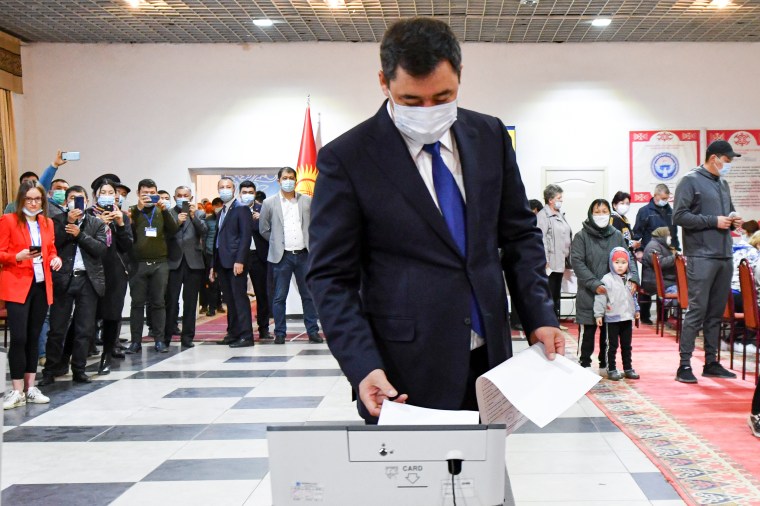Stockholm, April 13, 2021 — Kyrgyz authorities should investigate the harassment of journalists covering elections and ensure that members of the press can work freely and safely, the Committee to Protect Journalists said today.
On April 11, police officers detained at least four journalists covering voting in Kyrgyzstan’s local elections and a nationwide constitutional referendum, and election onlookers attacked at least one reporter, according to news reports and representatives of the involved media organizations who spoke to CPJ.
“If Kyrgyzstan’s elections are to be seen as free, fair, and legitimate, journalists must be able to cover them freely and without fear of detention and harassment,” said CPJ’s Europe and Central Asia program coordinator, Gulnoza Said, in New York. “Kyrgyz authorities must investigate the police detentions of journalists Bekmyrza Isakov, Aliyma Alymova, Ayarbek Joldoshbayev, and Aijan Avazbekova, and ensure all members of the press can cover events of national significance freely and safely.”
At about 12:30 pm, in the southern city of Osh, a group of men and women confronted Bekmyrza Isakov and Aliyma Alymova, correspondents for the independent news website Kloop, while they were trying to interview a group of women voters at a polling place, according to news reports and Ayzirek Almazbekova, coordinator of Kloop’s election monitoring program, who spoke to CPJ in a phone interview.
A man told the interviewees that the journalists were “traitors,” and women and men in the group repeated that accusation, with one woman pushing Isakov, striking him in the arm, and stealing his phone, according to those reports and Almazbekova. When Isakov took out a second cell phone to film the altercation, a man in the group stole that as well, along with the phone of a volunteer election monitor who was assisting the Kloop team, according to those reports, Almazbekova, and a video of the scuffle posted to YouTube by Kloop.
Police officers were present at the scene, but only intervened after the woman who struck Isakov refused to return the phones except at a police station, according to those reports, which said that police then took the two journalists, the election monitor, and the woman to the local police station for questioning.
The woman argued that she had not given her permission to be filmed and filed a complaint accusing the journalists of violating Article 266 of the Kyrgyzstan criminal code, which pertains to “hooliganism” and carries a maximum penalty of five years in prison, Almazbekova said. She added that the journalists also filed a counter-complaint, but she did not know details about it.
After about three hours, the journalists gave statements to police and were released without charge. Police returned two cell phones to the journalists, but the election monitor’s phone remains in police possession, according to Almazbekova and an interview that Alymova and the election monitor gave to Kloop.
At about 6 p.m., police in Osh also detained Ayarbek Joldoshbayev, a reporter with the independent news website Eldik.media, while he was filming at another polling station, according to news reports and an Eldik.media representative, who responded to CPJ’s questions sent to the outlet’s WhatsApp account but did not provide their name.
Police told Joldoshbayev that he did not have permission from the polling station’s chairman to film at the location, and took him to the local police station, according to those sources.
Police held the journalist for about an hour and then released him after he provided a statement, and authorities are continuing to investigate the case, according to the Eldik.media representative and a report by the outlet.
Separately, police in the capital, Bishkek, detained Kloop reporter Aijan Avazbekova while she was filming at a polling station, according to Almazbekova. The journalist was held for at least two hours, gave a statement, and was released, Almazbekova said.
In both Joldoshbayev and Avazbekova’s detentions, police claimed that the journalists lacked the necessary permission to film, according to Almazbekova and Eldik.media’s news report. Almazbekova said that a “domkom” – a local housing committee representative monitoring the elections on behalf of certain candidates or ballot measures – called the police in both cases.
According to Kyrgyz laws on elections and referenda, members of the media have the right to film within polling stations.
“We had recorded so many [electoral] violations,” Alymova told Kloop, “[but] all our work was brought to a stop.”
CPJ emailed the Interior Ministry of the Kyrgyz Republic for comment, but did not receive any reply.
Previously, in October 2020, unidentified men attacked a Kloop reporting team that was covering Kyrgyzstan’s parliamentary elections, as CPJ documented at the time.
